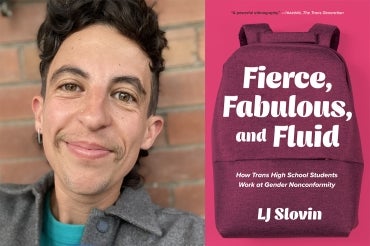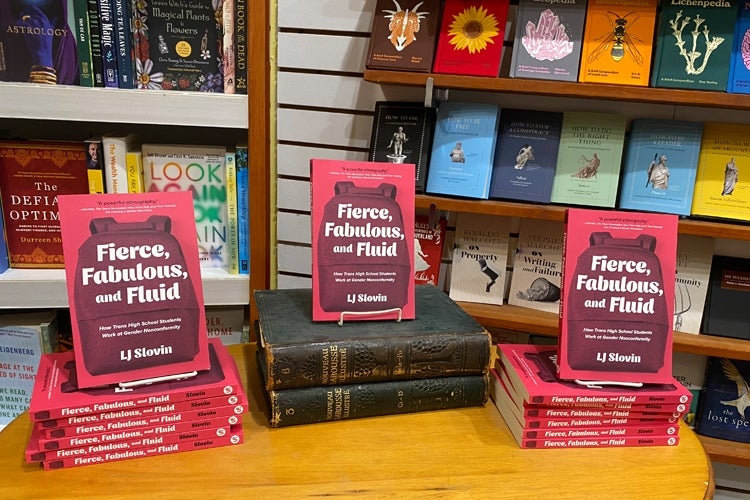‘Fierce, Fabulous, and Fluid’: U of T researcher explores the work done by trans youth to create inclusive spaces

LJ Slovin, a post-doctoral researcher at U of T’s Mark S. Bonham Centre for Sexual Diversity Studies, is set to have their book on trans youth in high schools, Fierce, Fabulous, and Fluid, released this summer (photos courtesy of LJ SLovin, University of Regina Press)
Published: July 19, 2024
Being trans in high school today can be a lot of work – and while some of that work can be seen, much of it can’t.
LJ Slovin is fascinated with this physical, mental and emotional labour that trans youth undertake each day in order to feel safe, connected to their peers and to comfortably and safely express who they are.
A post-doctoral researcher at the University of Toronto’s Mark S. Bonham Centre for Sexual Diversity Studies, Slovin spent a year with several trans youths at a high school in western Canada to better understand this kind of labour.
Their findings are documented in a new book to be published this August, Fierce, Fabulous, and Fluid: How Trans High School Students Work at Gender Nonconformity.
“As a trans non-binary person and a former youth worker, I’ve worked with a lot of trans youth,” Slovin says.
“I was interested in the normative ideas that shape what we understand as trans in schools, and how those limited ideas create a context in which trans youth have to do a lot of labour.”
The book is filled with stories about the day-to-day experiences of six high school trans students between the ages of 14 and 18 who Slovin worked alongside for a year.
Slovin observed some students from a distance by sitting in the same classrooms.
“Some other young folks wanted me to be with them all the time,” they say. “I went to their classes, we hung out at lunch. I went to all their performances in the evenings, we would leave school at the end of the day and get snacks.”
Slovin was also intrigued with how the participating school operated and observing how these youth navigated socially within it.
“That included looking at school policy and the school’s physical space, but it also included the relationships the trans youth had with teachers [and] with other classmates – looking at all of these elements of a school that a young person would interact with on a daily basis.”

Slovin identified three different forms of work that the students undertook.
The first is the labour of understanding and forgiveness by continually having to be patient and compassionate when others incorrectly identified them.
“I was in a progressive school; many of the adults had good intentions towards supporting trans folks,” says Slovin.
But Slovin nevertheless noticed that the teachers, though well-meaning, would make mistakes when identifying the students’ names, genders or pronouns. The adults also wanted the students to extend empathy to them as they tried to be allies.
“That creates work for a young person to be like, ‘I understand this is a challenging thing for you to learn, and I forgive you for misgendering me,’” Slovin says, adding that such interactions – continually having to correct, explain and forgive – can be emotionally taxing.
The second type of labour Slovin observed is what they describe as legibility: having to make a distinct effort to demonstrate one is trans to elicit a response. While not all students were interested or compelled to perform this labour, Slovin says those students who wanted to be recognized as trans did this work on a regular basis.
“If they want to access accommodations, they have to be known as a transgender person, which means they have to do something to make themselves visible to adults,” they say. “So, they behave in a way that would be expected according to normative notions of trans identity.
“These students are understanding adults’ ideas of what it means and looks like to be trans, and then trying to enact that so that they can access the accommodations they need so that they’re not misgendered all the time.”
This can result in inner conflict and frustration, with some students being conflicted about how to dress, speak and act in a way that conforms to people’s often narrow understandings about trans identity.
The third form of labour Slovin calls “world building” – trans youth creating, maintaining and investing in safe spaces where they can be themselves with no expectations or demands.
“Safe spaces are tricky,” says Slovin. “People are creating them based on what they need to feel safer in a school. I was interested in the spaces they built away from all of the surveillance and observation where they could just live in relation to their gender in ways that weren't noticed in school.”
One such space was the tech booth in the school’s theatre, where Slovin spent hours with two students.
“When we were in the tech booth, everything was different,” they say. “They didn't have to prove that they were trans to me or to each other, they didn't have to worry about having their pronouns respected, they didn't have to worry about dressing in a certain way that undercut their legitimacy as being who they are.
“They were able to dream about what it would be like when they were not in the school anymore, and they could live in a trans community and live more aligned with their desires.”
Through their book, Slovin hopes to provide educators with ideas about how to re-evaluate school environments.
“How do we shift the ways that we think about trans youth and about gender nonconformity? What if we step back and ask, ‘What is happening in school environments that is creating hardship for young people?’
“Instead of adults being accommodating when a transgender person makes themselves known, what about creating environments that already invite the possibility of gender non-conformity?”
Slovin is looking forward to discussions their book will spark upon its release next month.
“It was an amazing project,” they say. “To spend all of that time with the same people was a gift. I got a lot out of the time we spent together – a lot of joy, because for all the ways that we talked about trans folks dealing with intense things, it was just lovely to share that time and space with them.”



